11 Top Examples of Integrity in the Workplace To Exhibit [Infographic]
Having integrity in the workplace is an unspoken requirement for most employers and HR teams. However, being honest, compassionate, and dependable are all qualities we should strive for in general.
Maintaining workplace integrity falls on everyone’s shoulders—from C-suite executives to human resources teams and everyone in between. We all have a duty to uphold our own ethical principles and standards, both in our everyday lives and places of work.
Despite this, we can only be responsible for our own actions and behavior. So, try your best to exhibit these eleven examples of integrity in the workplace and contribute toward a positive working environment for everyone:
- Be there for other team members
- Try to improve your work ethic and productivity
- Help create a positive work environment
- Be able to be trusted and trust others with confidential information
- Strive for respectful, open communication
- Be accountable for your mistakes
- Always display trustworthiness and dependability
- Align with company values at all times
- Set a good example (be a role model for everyone)
- Be willing to work hard and bring your true self every day
- Share opinions but keep them respectful
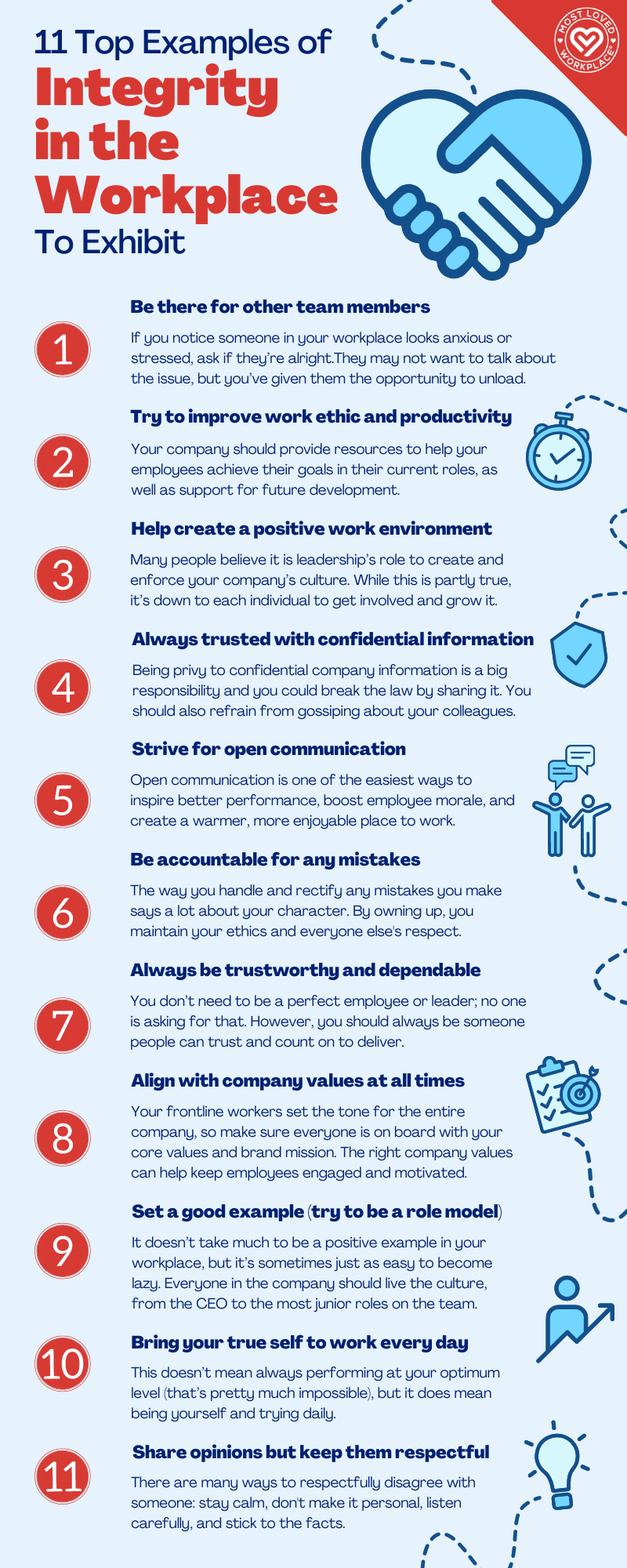
What Does Integrity Mean in the Workplace?
Having integrity generally means you uphold high moral standards in everyday life. If a cashier gives you too much change and they don’t realize, you let them know so they can correct the mistake.
In the workplace, integrity relates to your behavior and actions in the office, store, or factory. These can range from simple things, like showing up at the time you’re supposed to, to more important traits—like keeping confidential information to yourself.
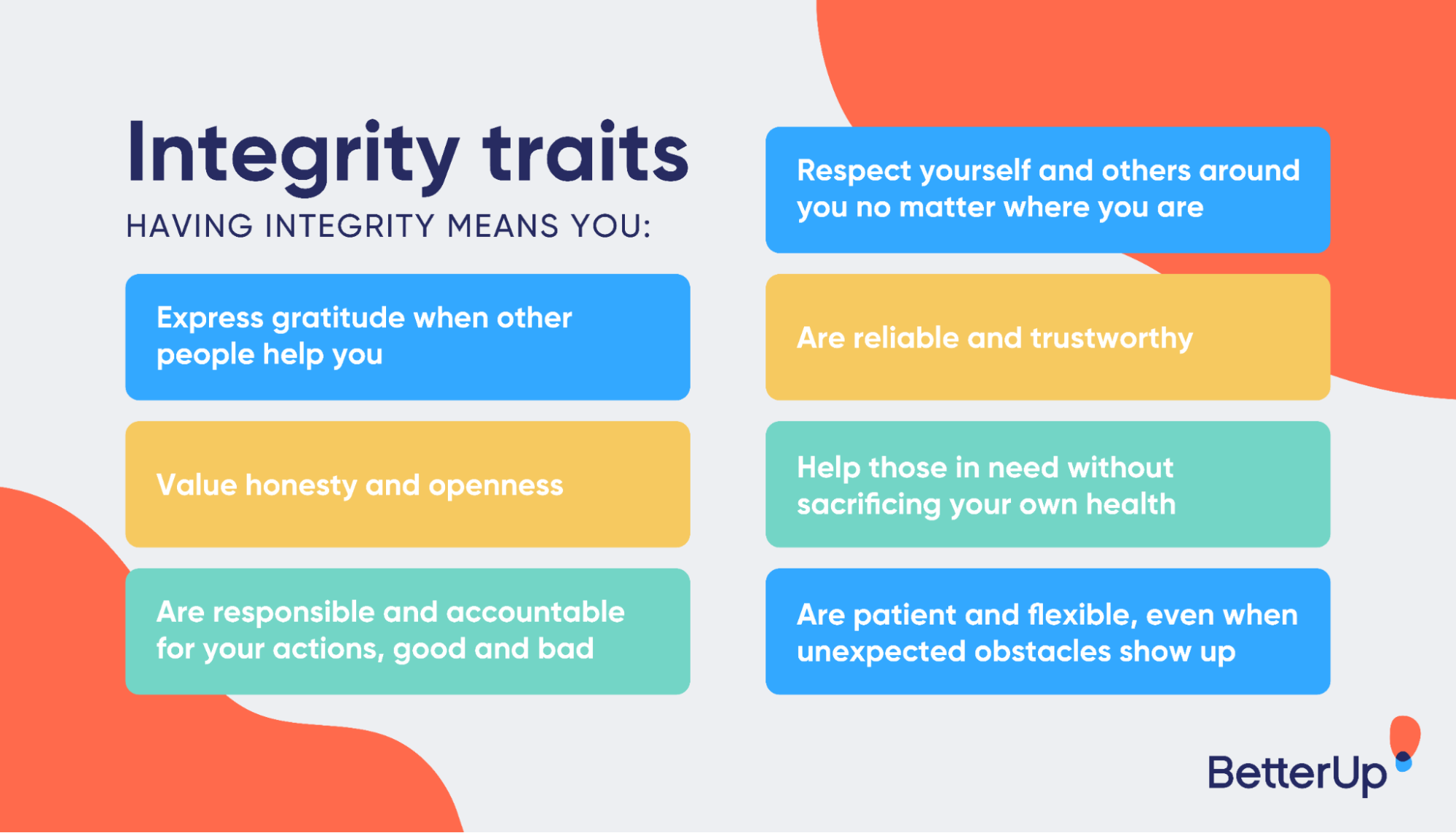
Having workplace integrity can also mean following your company’s ethical standards; the set of principles that outline its underlying values. 95% of businesses in a recent survey said, “integrity is one of their organizational values.” So, while companies may not ask if you have the trait in interviews, you know it’s important.
Here’s how you can become a person of integrity in your workplace with a strong moral compass.
1. Be There for Other Team Members
Not being a team player is one of the fastest ways to show a lack of integrity. Sure, it’s important to be able to manage your time and get through your own workload, but being a reliable colleague should be a priority too.
If you notice someone in your workplace looks anxious or stressed, ask if they’re alright. They may not want to talk about the issue, but you’ve given them the opportunity to unload.
Work relationships and friendships can make the experience more enjoyable for some. However, the number one reason 78% of employees give for loving their workplace is feeling valued and respected. You don’t have to form strong bonds with anyone in particular but try to treat everyone respectfully.
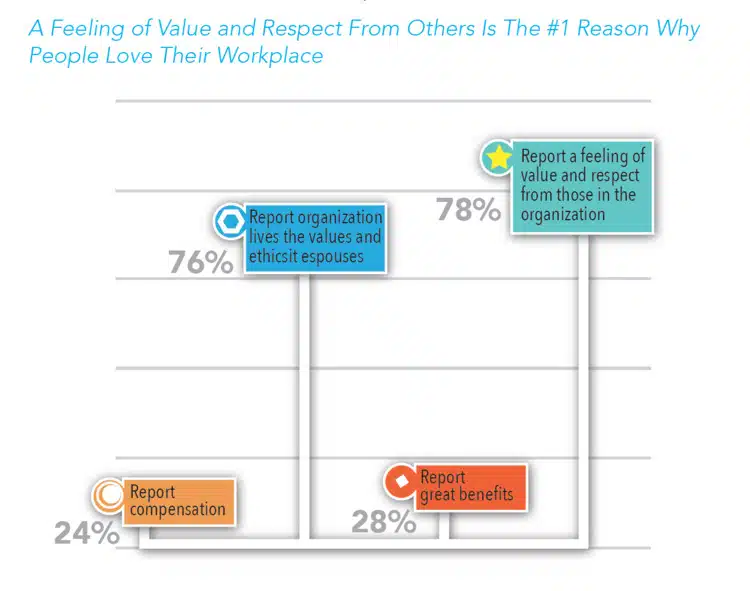
Even on busy days, it only takes a few minutes to lend an ear to a colleague who’s having a problem you can potentially help with. Otherwise, you can direct them to someone better fitted to the task. It’s a cliché but, quite simply, treat others how you’d like to be treated (because you may need it too someday.)
2. Try To Improve Your Work Ethic and Productivity
No one is born with a strong work ethic instilled. It develops due to a combination of:
- Parenting
- Schooling
- Work experience
- Social interaction
However, that doesn’t mean we can’t improve our current baseline. Having integrity also means constantly trying to better yourself; for your own personal growth and the benefit of your company.
Here are a few ways to improve your work ethic and productivity:
- Practice being present (meaningful participation, listening, and concentration)
- Follow through on your promises and meet deadlines
- Focus on the quality of your work
- Volunteer for extra tasks
Your morning routine before you get to work can also have an impact. So, make sure you get enough sleep, eat breakfast, and perhaps try meditating or exercising to get you in the right mindset.
From a leadership perspective, you should provide resources to help your employees achieve their goals in their current roles, as well as support for future development. It’s all about growing in tandem as an individual and a company.
3. Help Create a Positive Work Environment
Many people believe it is leadership’s role to create and enforce your company’s culture. While this is partly true, it’s down to each individual to get involved and grow it.
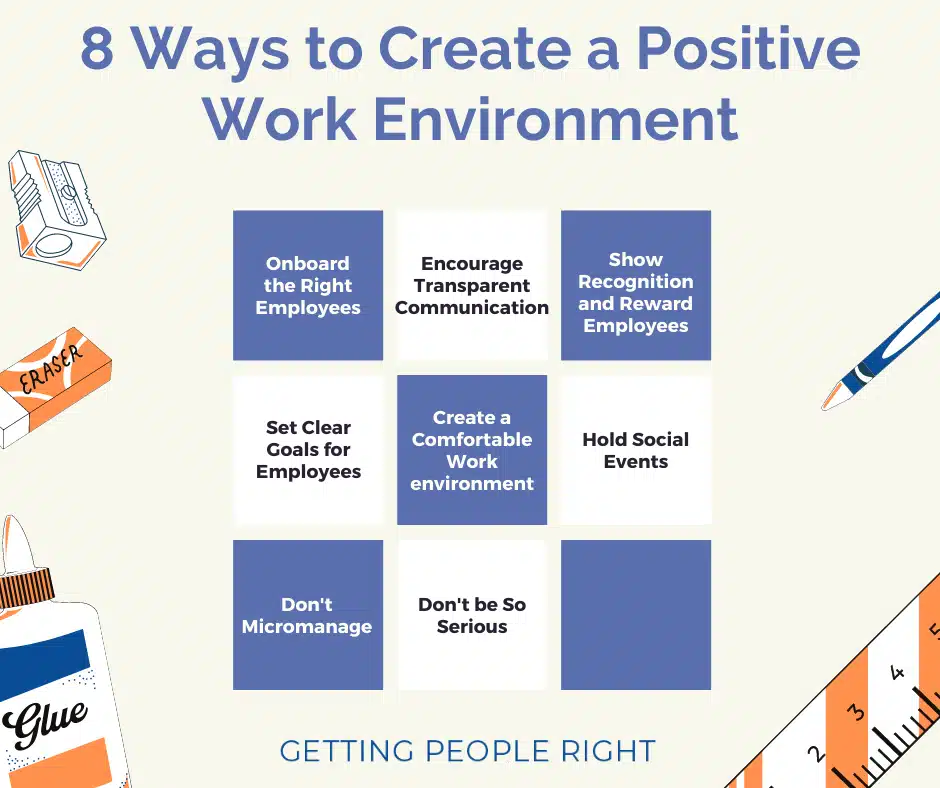
Everyone at every level can contribute to company culture. Here are three easy ways to get more involved in yours:
- Be willing to offer cover to those who need it (you will too)
- Celebrate the achievements of others
- Get to know your co-workers on a personal level
We’re humans, not robots, and everyone has off days—but you should still strive to be a dependable, friendly member of the team. So, try and bring your everyday moral principles to work with you, even when you don’t feel like it.
Creating a positive work environment is a job for everyone in the company, so work together to make it enjoyable. Suggest ideas for team-building days or ways to brighten up the office; you never know what might be implemented. Even if not, it still shows you’re a team player who isn’t afraid to share suggestions to improve daily working life for all.
(Part of HR or leadership? Learn how to become a certified Most Loved Workplace today.)
4. Be Able To Be Trusted and Trust Others With Confidential Information
Being privy to confidential company information is a big responsibility, so a high level of integrity is expected. The importance is also heightened due to the potential legal ramifications of not following through.
Certain information is protected by law in many countries, including financial data or private information that identifies an individual. Sharing this with an unauthorized third party may not only jeopardize your reputation; it could be breaking the law. The importance of integrity, in this case, is so you comply with both legal and ethical guidelines around confidential company information.
On a more personal level, we all want to be the type of person our friends and family feel they can confide in. So, if a colleague tells you something in confidence, keep it to yourself. Effective teamwork is based on trust, and there’s no faster way to lose it than gossiping. If you wouldn’t say something you’ve heard to the person’s face, don’t say it behind their back.
5. Strive for Respectful, Open Communication
Whatever your role in your company, you can be part of creating a culture of open communication. It’s one of the easiest ways to inspire improved performance, boost employee morale, and create a warmer, more enjoyable place for everyone to work.
Teams with an open work style are 60% more likely to achieve more (faster) and 80% more likely to report high emotional well-being.
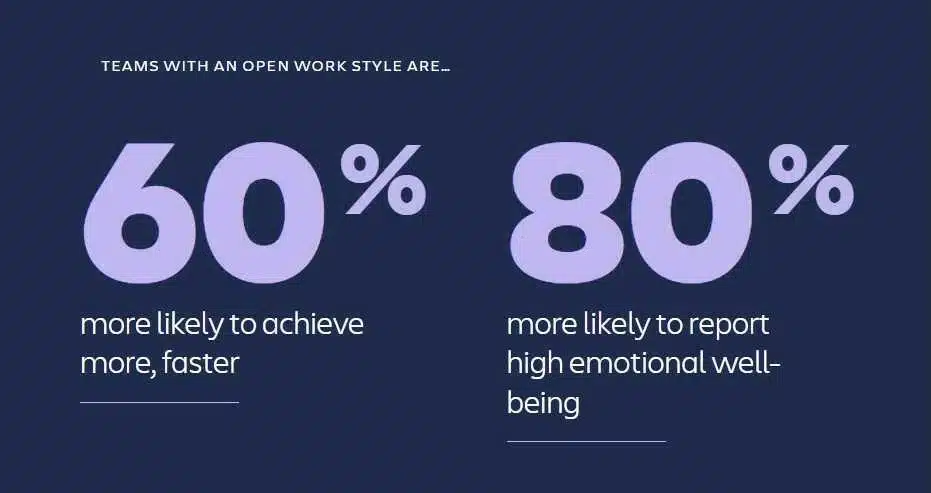
Here are a few tips to encourage open communication as a leader:
- Ask for continuous prompt feedback
- Arrange regular one-to-one meetings with those you are managing
- Have employees fill in anonymous surveys
- Hold employee exit interviews
You should always aim to respect others in the workplace and avoid getting involved in negative conversations about co-workers or employees. Be prepared to give honest feedback but share it in a kind, diplomatic manner. Furthermore, allow your team to speak freely and share ideas without reacting condescendingly.
6. Be Accountable for Your Mistakes
We’re all human, and we all make mistakes, but there’s nothing worse than someone who won’t admit when they are wrong—or even worse, blames others for their shortcomings. The way you handle and rectify any mistakes you make says a lot about your character. By owning up, you maintain your ethics.
It may hurt your ego, but one of the top examples of integrity in the workplace is taking responsibility for your own mishaps. If you can blame someone else and get away with it, you will lose the respect of others quickly. Owning up to your mistakes allows you to learn from them and ensure you don’t make the same ones in future.
Everyone has certain abilities, and while we can add to and improve these, there will always be certain skills we’ll never get the hang of. In this case, we shouldn’t be ashamed of what we can’t do; it’s better to ask for help rather than suffer in silence.
Having integrity is being able to admit you’re struggling with a task without fear of embarrassment. It’s about letting go of our sense of self and working as a team for the greater company goal.
7. Always Display Trustworthiness and Dependability
Trustworthiness and dependability in the workplace mean that you can be counted on to get things done. Without trust, there is no teamwork or efficient collaboration, and lack of both of these will prevent your company from growing.
Everyone at every level should strive to be honest, open, and respectful.
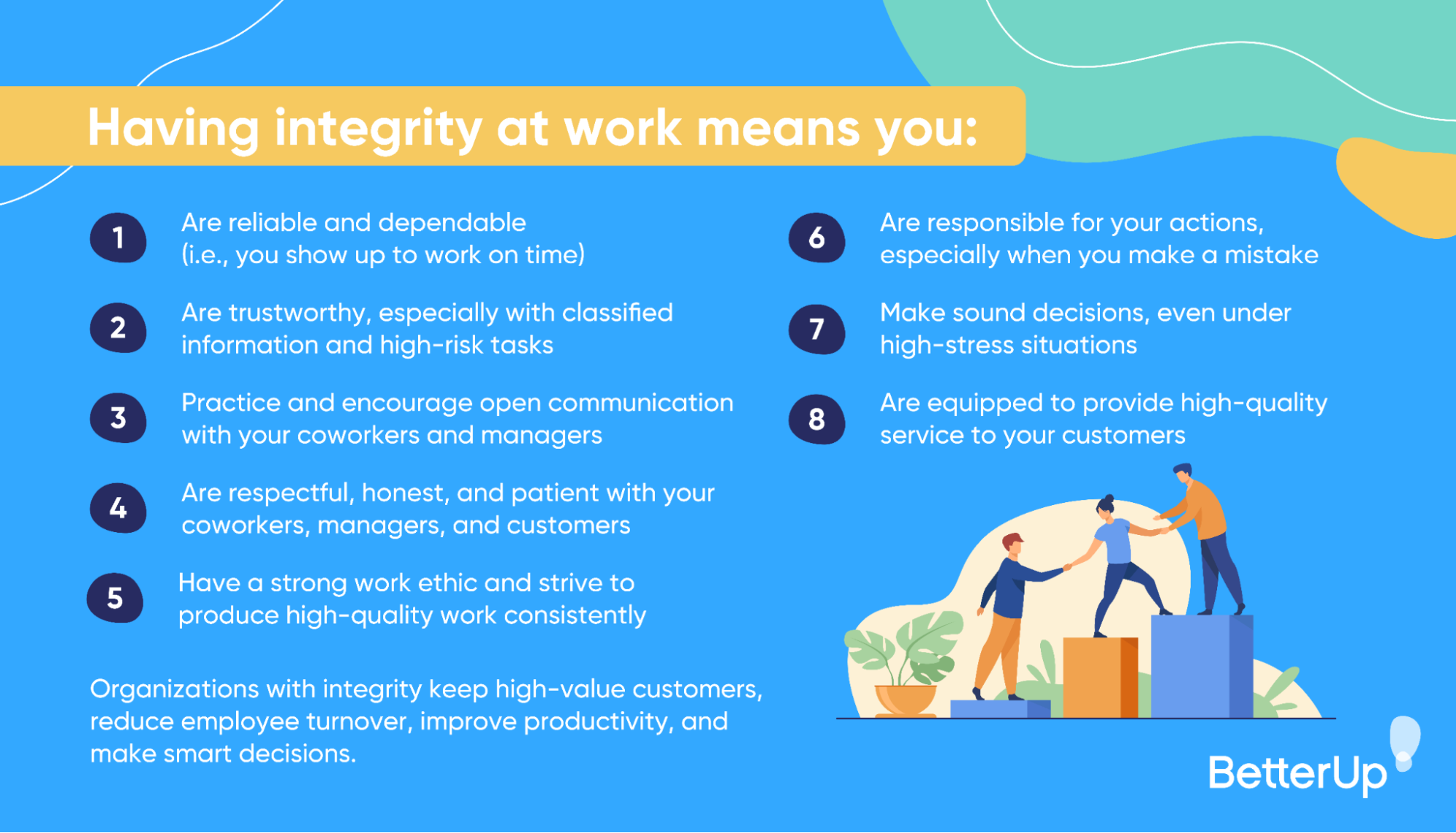
Sure, you may not get on with everyone, but it’s important to give all those you work with the same level of respect. So, how can you display these important traits in the workplace?
Here are a few ideas:
- You can be counted on to meet deadlines
- You communicate honestly and transparently
- You go above and beyond to help others
- You keep your promises
You don’t need to be a perfect employee or leader; no one is asking for that. However, you should always be someone people can trust and count on.
8. Align With Company Values at All Times
Company policy guides everyone’s behavior and actions to create a safe, pleasant working environment. You may think that banning phone calls for personal use may make your employees more productive. However, it could have the opposite effect. On the other hand, the right company values can help keep employees engaged and motivated.
So, how do you align your values with employee engagement?
- Consult all levels of employees when creating company values
- Encourage purpose rather than process
- Prioritize community in your organization
- Encourage collaboration wherever possible with a common purpose
You want to share your thoughts and goals with your staff at all levels. If they feel involved in the process, it’s more likely you’ll have a seamless flow. Your frontline workers set the tone for the entire company, so make sure everyone is on board with your core values and brand mission.
In the case of others, if you know that a colleague isn’t following these values (especially by engaging in something serious like theft or bullying), you have a duty to report this unethical behavior.
9. Set a Good Example (Be a Role Model for Everyone)
It doesn’t take much to be a positive example in your workplace, but it’s sometimes just as easy to become lazy. Everyone in the company should live the culture, from the CEO to the most junior roles on the team. If you’ve been part of a company for several years, remember, you represent that business best.
You don’t need to walk around the office constantly smiling (unless you work at Disneyland), but you can still be a role model for others. Say a junior employee comes to you for career advice, be friendly, and set aside some time for them—even if you’re too busy to do it right when they ask.
Here are some more examples of setting both good and bad examples in the workplace:
|
Good example |
Bad example |
|
Shows up a little early every day to start the shift on time. |
Turns up late regularly without an apology. |
|
Answers any questions in a friendly manner or politely arranges to set aside time later if busy. |
Tells colleague you’re too busy without bothering to look at them. |
|
Listens to feedback/constructive criticism and makes positive changes based on it. |
Ignores any feedback, even if members of the team are clearly unhappy. |
These are little things we can all work on to ensure we’re someone that others can look to when they’re struggling.
10. Be Willing To Work Hard and Bring Your True Self Every Day
Hard work can be stressful, sometimes dull, and tiring. However, having integrity means you always bring your true self to the workplace every day. This doesn’t mean always performing at your optimum level (that’s pretty much impossible), but it does mean being yourself and trying daily.
Integrity means putting in the effort, even if you can get away with doing the bare minimum—because that isn’t being true to yourself and your moral principles.

If you need some motivation, here are some tips that can inspire you to work harder:
- Remember your reasons for being there (money to fund your lifestyle, aspiring for promotion, etc.)
- Surround yourself with other motivated, hard-working people
- Prioritize your health outside of work so you can bring your best self every day
- Break down big goals into lots of little ones and reward yourself along the way
- Find a mentor to help train or guide you
Working hard doesn’t just benefit your work life; it’ll also help you accomplish your goals and grow as a person.
11. Share Opinions but Keep Them Respectful
If you’re involved in decision-making or feel strongly about an incorrect one, then being honest about it is another example of integrity. However, using unprofessional language or raising your voice are not the ways to get your feelings across—this is also important if you are on the receiving end of feedback.
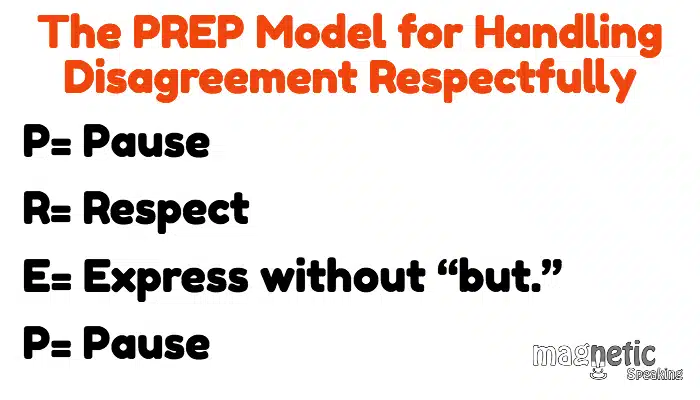
There are four key ways to respectfully disagree with people:
- Listen carefully and don’t put down other people’s opinion
- Don’t make it personal
- Stay calm
- Use facts over opinion
It can also help to pick out something you agree with in the other person’s argument. For example, you might say, “I definitely agree with you that we need to look at improving our shipping times. However, what if we looked at it from this angle instead?” This way, you’re turning your idea into something collaborative and moving away from disagreement.
Final Word
These eleven top examples of integrity in the workplace aren’t difficult to integrate into your routine. Although it may help to focus on one at a time, you may be doing several of them already without realizing.
Workplace integrity involves trying your best and being honest, trustworthy, and dependable. Yes, it means sharing your honest opinion but also doing it in a way that doesn’t escalate the conflict. Strive to be true to yourself and your ethical principles in your personal life too. This way, you’ll probably find these traits organically seep into your workplace routine.
Now, which of these examples are you going to start working on first?

Louis Carter is the founder and CEO of Best Practice Institute, Most Loved Workplace, and Results-Based Culture. Author of In Great Company, Change Champions Field Guide, and Best Practices in Talent Management, as well as a series of Leadership Development books. He is a trusted strategic advisor and coach to CEOs, CHROs, and leaders of mid-sized to F500 companies – enabling change and steering employer brand development together with highly effective teams, leaders, and organizations as a whole.

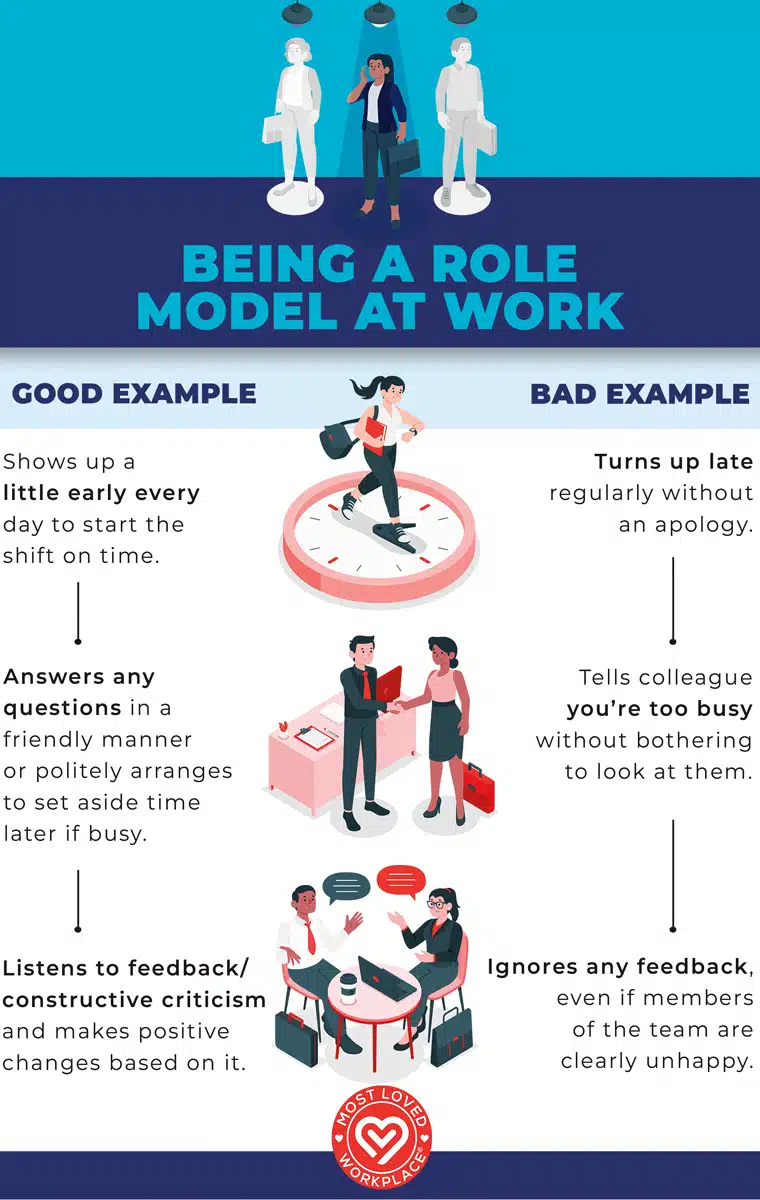
0 Comments